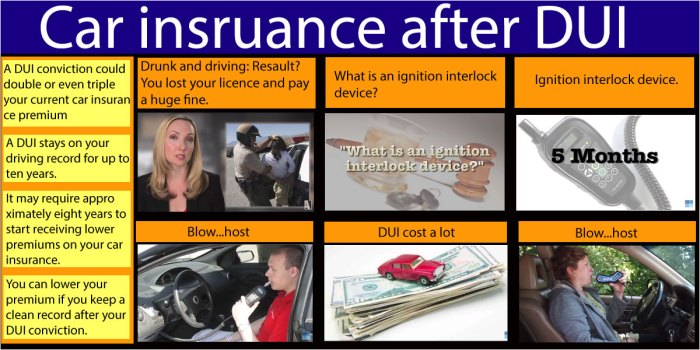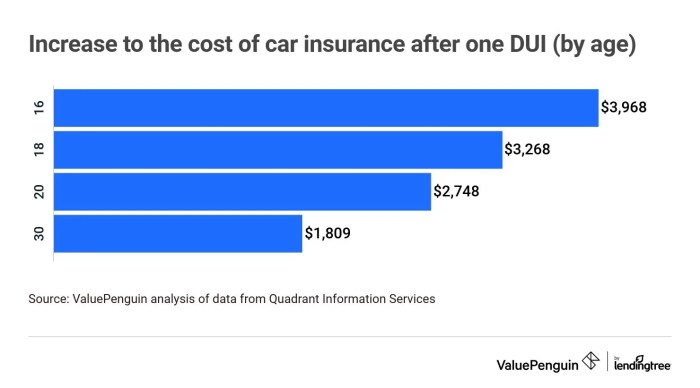Amica car insurance for drivers with a DUI or traffic violation can be a lifesaver for those who have made a mistake on the road. Amica has a reputation for being fair and understanding, even when it comes to past driving offenses.
They’re not just another insurance company, they’re known for their commitment to customer service and their dedication to helping people get back on track.
This guide will delve into the specifics of Amica’s policies for drivers with a DUI or traffic violation, exploring how they assess risk, adjust rates, and offer coverage options. We’ll also discuss the impact of these offenses on insurance costs, strategies for managing them, and alternative insurance options if Amica doesn’t work out.
Amica’s Approach to Drivers with DUI or Traffic Violations

Amica, like many insurance companies, acknowledges that drivers with a history of DUI or traffic violations pose a higher risk. They have a specific approach to evaluating and insuring these individuals, taking into account the nature of the offense and the driver’s overall risk profile.
Amica’s Risk Assessment Process for Drivers with DUI or Traffic Violations
Amica employs a comprehensive risk assessment process to determine the appropriate coverage and rates for drivers with DUI or traffic violations. This process considers various factors beyond the offense itself, such as:
- The severity of the offense: Amica assesses the severity of the DUI or traffic violation, considering factors like the blood alcohol content (BAC) level, the number of offenses, and the circumstances surrounding the incident.
- The driver’s driving history: Amica reviews the driver’s past driving record, including any previous accidents, violations, or insurance claims.
- The driver’s age and experience: Amica considers the driver’s age and driving experience, as these factors can influence risk.
- The driver’s driving habits: Amica may inquire about the driver’s daily commute, mileage, and other driving habits to assess their risk exposure.
- The driver’s vehicle: Amica may consider the type of vehicle driven, as some vehicles are considered higher risk than others.
Amica’s Potential Rate Adjustments or Coverage Restrictions
Based on the risk assessment, Amica may adjust rates or apply coverage restrictions for drivers with DUI or traffic violations. These adjustments may include:
- Higher premiums: Amica may increase insurance premiums for drivers with DUI or traffic violations to reflect the increased risk they pose.
- Coverage restrictions: Amica may impose coverage restrictions, such as limiting the amount of coverage available or excluding certain types of coverage, for drivers with a history of DUI or traffic violations.
- Surcharges: Amica may impose surcharges, which are additional fees added to the premium, for drivers with DUI or traffic violations.
Impact of DUI and Traffic Violations on Insurance Costs: Amica Car Insurance For Drivers With A DUI Or Traffic Violation

Getting a DUI or traffic violation can significantly impact your car insurance premiums. These offenses are considered high-risk factors, leading insurance companies to view you as a greater risk to insure. This increased risk translates to higher premiums.
Factors Contributing to Increased Insurance Costs
Insurance companies consider various factors when determining your premiums, including your driving history. A DUI or traffic violation can significantly impact your insurance costs. Here’s why:
- Increased Likelihood of Accidents:Drivers with a DUI or traffic violation are statistically more likely to be involved in future accidents. This increased risk of accidents makes insurance companies less willing to insure you at the same rate as drivers with clean records.
- Higher Claim Costs:Accidents involving drivers with DUI or traffic violations often result in more significant damage and injuries, leading to higher claim costs for insurance companies. This increased cost is reflected in higher premiums for these drivers.
- Legal and Administrative Costs:Insurance companies also face additional legal and administrative costs when dealing with drivers with DUI or traffic violations. These costs can include defending against lawsuits, handling fines and penalties, and managing the increased risk associated with these drivers.
Duration of Premium Increases
The duration of premium increases for drivers with DUI or traffic violations can vary depending on several factors, including:
- Severity of the Offense:A DUI conviction generally results in more significant premium increases than a minor traffic violation. The severity of the violation directly impacts the perceived risk associated with the driver.
- Insurance Company Policies:Each insurance company has its own set of policies regarding premium increases for drivers with DUI or traffic violations. Some companies may have a more lenient approach than others.
- Driving Record:Your overall driving record can influence the duration of premium increases. Maintaining a clean driving record after a DUI or traffic violation can help demonstrate your commitment to safe driving and potentially lead to a faster reduction in premiums.
- State Laws:State laws can also impact the duration of premium increases. Some states may have specific regulations regarding how long insurance companies can consider a DUI or traffic violation when setting premiums.
It’s important to remember that premium increases for DUI or traffic violations can last for several years. The duration of these increases can be significantly reduced by maintaining a clean driving record and demonstrating responsible driving habits.
Tips for Maintaining a Clean Driving Record

A clean driving record is crucial for maintaining affordable car insurance premiums. Even minor traffic violations can significantly impact your insurance costs. Here are some essential tips to help you maintain a safe driving record and potentially save money on your insurance:
Safe Driving Practices, Amica car insurance for drivers with a DUI or traffic violation
Safe driving practices are the foundation of a clean driving record. They minimize the risk of accidents and traffic violations, ultimately reducing your insurance premiums.
| Driving Practice | Description | Impact on Insurance | Tips |
|---|---|---|---|
| Defensive Driving | Anticipating potential hazards and taking proactive measures to avoid accidents. | Reduced risk of accidents and violations, leading to lower premiums. | – Maintain a safe following distance.
|
| Speeding | Exceeding the posted speed limit. | Increased risk of accidents and violations, leading to higher premiums. | – Obey speed limits and adjust speed for road conditions.
|
| Distracted Driving | Engaging in activities that divert your attention from the road, such as using a cell phone, eating, or applying makeup. | Increased risk of accidents and violations, leading to higher premiums. | – Avoid using cell phones while driving, even hands-free devices.
|
| Driving Under the Influence (DUI) | Operating a vehicle while under the influence of alcohol or drugs. | Significant increase in premiums and potential license suspension. | – Never drive under the influence of alcohol or drugs.
|
Ultimate Conclusion

Navigating the world of car insurance after a DUI or traffic violation can be stressful, but it’s important to remember that you have options. Amica is one company to consider, and they might be able to offer you the coverage you need at a reasonable price.
However, it’s crucial to explore all your options and compare quotes from various insurance providers to find the best fit for your situation. Don’t be afraid to ask questions and seek guidance from an insurance broker or agent to make the most informed decision for your peace of mind.
Top FAQs
What if I have multiple DUI convictions?
Amica, like most insurers, will likely have a stricter policy for drivers with multiple DUIs. They may require you to complete a driver improvement program or have higher premiums. It’s important to be upfront with them about your driving history.
Can I get a discount for completing a driver improvement program?
Yes, many insurance companies, including Amica, offer discounts for completing driver improvement programs. This demonstrates your commitment to safer driving and can help reduce your premiums.
How long will a DUI stay on my record?
The length of time a DUI stays on your record varies by state. It’s usually a minimum of 3-5 years, but can be longer depending on the severity of the offense. This can impact your insurance rates for years to come.
